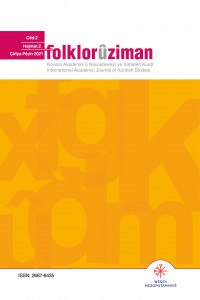Abstract
Amrazên ristegirêdanê yên kurmancîyê bi gelemperî kêşayî ne û ji bo nîşankirina girêdanê kîjan amraza morfolojîk hatibe hilbijartin, li gor wê diguherin. Ji bo nîşankirina risteyên temamker di zimanî da gelek vebijêrk hene: sifir-nîşankirin (pêkvebûna risteyan a parataktîk), rawe, bingihanekên sade û kompleks, û xurtkirina rêkkeftina bikerî bi rêya nîşanderan û anaforayê. Ev gotar belavbûna amrazên ristegirêdanê li ser esasê rûdana wan di korpûseka vegêranên axaftinî ya band tomarkirî da nîqaş dike. Encamên ji vê lêkolînê bidestxistî têkildarî pêşbînîyên li ser unîversalên semantîk-tîpolojîk ên temamkirinê ne. Piştî vê, nîqaşeka kurt a pozîsyona herêmî ya kurmancîyê dihê ku ez di encama wê da engaşt dikim ku îzoglosa sereke ya hevpar di zimanên nîqaşkirî da ew e ku ev ziman xwe dispêrin lêkerên kêşayî- heta di avabûnên kompleks yên herî bi pihêtî yekbûyî jî da ev yek wisa ye.
Abstract
Kurmanjî clause-linking devices are generally a) finite, and b) subject to variation in respect of the choice of morphological device that marks the link. There are several options for marking complement clauses in the language: zero-marking (paratactic apposition of clauses), mood, simple and complex complementisers, and reinforcement of subject agreement through deictics and anaphora. The paper discusses the distribution of clause-linking devices, based on their occurrence in a соrpus of tape-recorded and transcribed conversational narratives. The findings are related to the predictions on semantic-typological universale of complementation. A brief discussion of the areal position of Kurmanji follows, in conclusion of which I propose that the principal isogloss shared by the languages under discussion is their reliance on finite verbs even in the most tightly-integrated complex constructions.
Details
| Primary Language | English |
|---|---|
| Subjects | Language Studies |
| Journal Section | Translation |
| Authors | |
| Translators |
Sinan Gültekin This is me |
| Publication Date | October 30, 2021 |
| Published in Issue | Year 2021 Volume: 2 Issue: 2 |


